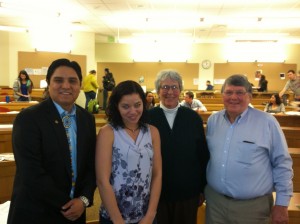
Ten law students will visit Durango from March 18-22 to draft wills for tribal members of the Southern Ute Reservation and Ute Mountain Reservation as part of the Tribal Wills Project, according to Sturm College of Law Professor Lucy Marsh.
“The students are giving up their spring break to go down and try to give some legal assistance,” said Marsh.
In November 2012, John Roach, Fiduciary Trust Officer for the Southwest Region, Department of Interior, reached out to the Student Law Office to see if students wanted to draft wills.
Students will interview tribal members and then draft a will for the tribal member to sign the same day. Marsh isn’t sure how many wills will get done each day.
“John Roach said he’s been telling the tribal members that we’ll be able to do 30 wills [a day] and they’re saying, ‘Oh please, we need more than that,’” said Marsh.
Marsh said there aren’t enough lawyers to help tribal members with their wills.
“If [the tribal members] don’t have wills, then the law that Congress passed [American Indian Probate Reform Act] says that their trust assets will just go down to the oldest child and then if there’s no oldest child, then to the oldest grandchild so that they can’t control,” said Marsh. “The way their trust assets descend is different from the property of a non-tribal member, where all the kids would get an equal share.”
The project is an expansion of the current wills lab taught at DU, where students draft wills for low-income people in the Denver area, according to Marsh.
This will be the first time DU is participating in the project.
“There are two or three other law schools in the country that do this, and the first one that did it was Columbia law school and their students have been doing it for about three years,” said Marsh. “So we’re behind Columbia but not far.”
The program is being limited to 10 law students since it is a new project.
“I think we’ve already gotten more than that many applications,” said Marsh. “We do want to keep it small this first year so we can keep control of it.”
Applicants have until 5 p.m. this evening to turn in their applications and will be notified on Wednesday.
There was an organizational meeting on Feb. 8, attended by Roach, Ernest House, Jr., executive secretary of the Colorado Commission of Indian Affairs from the Governor’s office and Justice Greg Hobbs of the Colorado Supreme Court.
“The governor’s office is in on it, the Supreme Court [of Colorado] is in on it and the Department of Interior,” said Marsh. “Representatives from all those groups have helped plan this project.”
Three training sessions are being offered. The first training session took place on Tuesday, Feb. 19 and was led by House, Jr. and Roach. David Armstrong, esquire director of the Indian Office in Wisconsin, will lead the next session on March 1.
“He’s been running the program the Columbia students are in,” said Marsh. “He’s coming out on March 1 to help train our students so that we know what we’re doing, hopefully.”
Hobbs will lead the March 4 meeting. Monte Mills, director of the Legal Department for the Southern Ute Indian Tribe, will speak to students when they arrive in Durango.
The training sessions are also open to local lawyers.
“This is a real specialty field of law and so we’re giving any lawyer who’s interested this free training,” said Marsh.
Marsh said she’s excited to see where the project goes.
“I think it’s going to be marvelous,” said Marsh. “I’ve already had students say, ‘Are you going to do it again next year?’ and my answer is I hope so, but we’ll have to see how it works out this year.”











